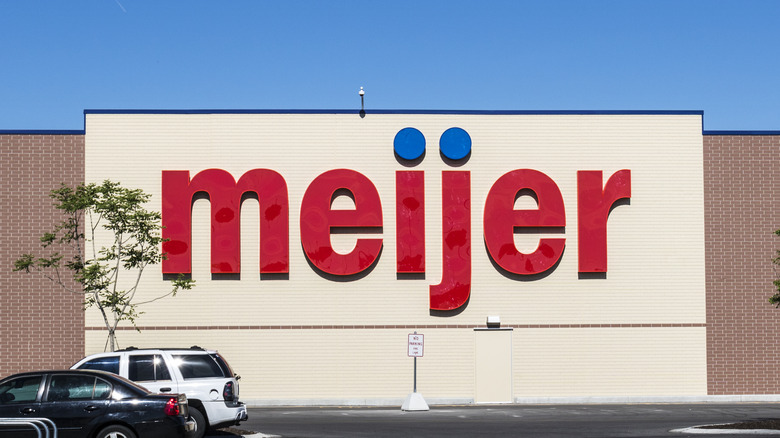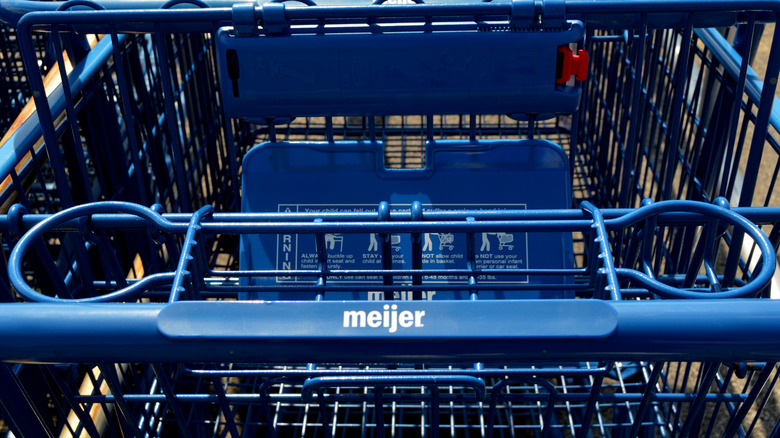Meijer's Intriguing Role In Retail History
The National Retail Federation ranked Meijer as the 24th largest retailer in the United States in 2022, but unless you've lived in the Midwest, you may not be familiar with this supercenter chain, let alone its history. Meijer has been a beloved staple in many communities throughout the Midwest since the first location opened in the 1930s — right in the midst of the Great Depression, according to Meijer.
As a result of the economic turmoil, about 15 million Americans lost their jobs by 1933 as their struggling employers terminated workers in an attempt to stay afloat, says History. The fallout from this downturn left many adults desperate to feed their families ... But a humble Michigan barber named Hendrik Meijer recognized the need and decided to take action to help members of his community, explains the retailer that bears his name.
In 1934, he bought over $300 of merchandise and opened his own grocery store, Meijer's Grocery, in Greenville, Michigan, with the help of his teen son, Fred — unaware that the store would later ignite a revolution in the world of retail.
Meijer as the supercenter pioneer
The first Meijer store survived the Depression and became a trailblazer in American retail and grocery stores nearly three decades later. But even before then, the store made a smaller-scale improvement to the shopping experience by adding carts in 1938, per Meijer. Although you'll find them in pretty much every major grocery store today, shopping carts didn't emerge in stores until 1937, as CBS News explains, putting Meijer at the front of the pack.
Meijer's success and innovation continued over the years. By 1941, a second store opened in Michigan, and in 1954, conveyor belts were added, according to the store's website. But the biggest innovation occurred in 1962, when Meijer opened its first food and general merchandise store, Thrifty Acres, in Grand Rapids. Executive Chairman Hank Meijer, Hendrik's grandson, looked back on this opening as "history in the making" in a 2022 press release, and an opportunity for the family business to better meet its customers' needs. Eventually, a cafe, pharmacy, clothing section, and other retail departments were added to Thrifty Acres.
It was the first time the supercenter concept — which allowed customers to buy groceries and other items from the same store — was introduced. That's right: Meijer was the pioneer of modern supercenters, and was even a big influence on Walmart founder Sam Walton, according to Atlas Obscura. More Thrifty Acres stores opened over the next two decades, but in 1986, all locations were renamed Meijer, per Zippia. By the end of the century, Meijer branched out beyond Michigan, reaching new shoppers in Ohio, Illinois, and Kentucky.
Meijer has always valued the customer
When Hendrik Meijer opened his first grocery store in the midst of the Great Depression, the decision was fueled by his desire to help his struggling barbershop customers, the Meijer website explains. After Hendrik died in 1964, Fred took over the company and helped further the revolutionary supercenter concept, as well as the customer-based, community-focused values passed on from his father, recalls the New Netherland Institute. Just as customers were prioritized at that humble barbershop in the 1930s, they have been the focus of Meijer stores ever since the first location opened its doors; in 2016, recounts The Shelby Report, Fred's son Hank repeated an adage from his grandfather at a conference: "Our customers don't need us. We need them."
In fact, it was the customer's interests that drove the "innovative foresight" behind America's first supercenter. In 2015, the Detroit Free Press reported, a Michigan Historical Marker was placed at the site of the first Thrify Acres, marking "the birthplace of the American superstore." It was born, Hank Meijer wrote in a statement, because his forefathers "saw an opportunity to bring families more retail choices and ultimately succeeded in breaking down traditional barriers" between selling different kinds of merchandise.
So whether you're a Midwestern Meijer customer yourself or shop at national chains like Walmart or Target, think of Meijer the next time you put a pack of Oreos and a pack of razors in the same shopping basket. You probably have this Michigan family business to thank, at least in part, for your go-to one-stop-shop experience.


